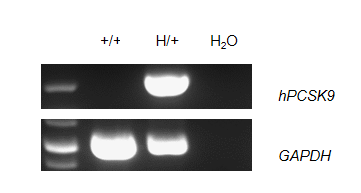B-hPCSK9 mice plus
| Strain Name |
C57BL/6-Pcsk9tm2(PCSK9)Bcgen/Bcgen |
Common Name | B-hPCSK9 mice plus |
| Background | C57BL/6 | Catalog number | 112751 |
|
Aliases |
FH3, FHCL3, HCHOLA3, LDLCQ1, NARC-1, NARC1, PC9 | ||
|
NCBI Gene ID |
255738 | ||
Description
- PCSK9 is expressed in liver, intestine and kidney tissues and escorts specific receptors for lysosomal degradation. It plays a role in cholesterol and fatty acid metabolism.
- PCSK9 binds to the receptor for LDL, if PCSK9 is blocked, more LDLRs are recycled and are present on the surface of cells to remove LDL-particles from the extracellular fluid.
- The genome of mouse Pcsk9 gene including 5’UTR and 3’UTR was replaced by human PCSK9 genome including 5’UTR and 3’UTR in B-hPCSK9 mice plus.
- Mouse and human PCSK9 were detectable in heterozygous B-hPCSK9 mice plus.
- This product is used for pharmacodynamics and safety evaluation of hypercholesterolemia and other metabolic diseases.
mRNA expression analysis in humanized B-hPCSK9 mice plus

Strain specific analysis of PCSK9 gene expression in wild-type mice and B-hPCSK9 mice plus by RT-PCR. Liver was collected from wild-type mice and heterozygous B-hPCSK9 mice plus. Human PCSK9 mRNA was detectable only in heterozygous B-hPCSK9 mice plus (H/+) but not in wild-type mice (+/+).
Protein expression analysis in serum

Strain specific PCSK9 expression analysis in heterozygous humanized B-hPCSK9 mice plus by ELISA. Serum was collected from heterozygous B-hPCSK9 mice plus (H/+) (n=1). Protein expression level of PCSK9 was analyzed by ELISA. Mouse PCSK9 and human PCSK9 were detectable in heterozygous B-hPCSK9 mice plus (H/+).











 京公網安備: 11011502005564號
京公網安備: 11011502005564號